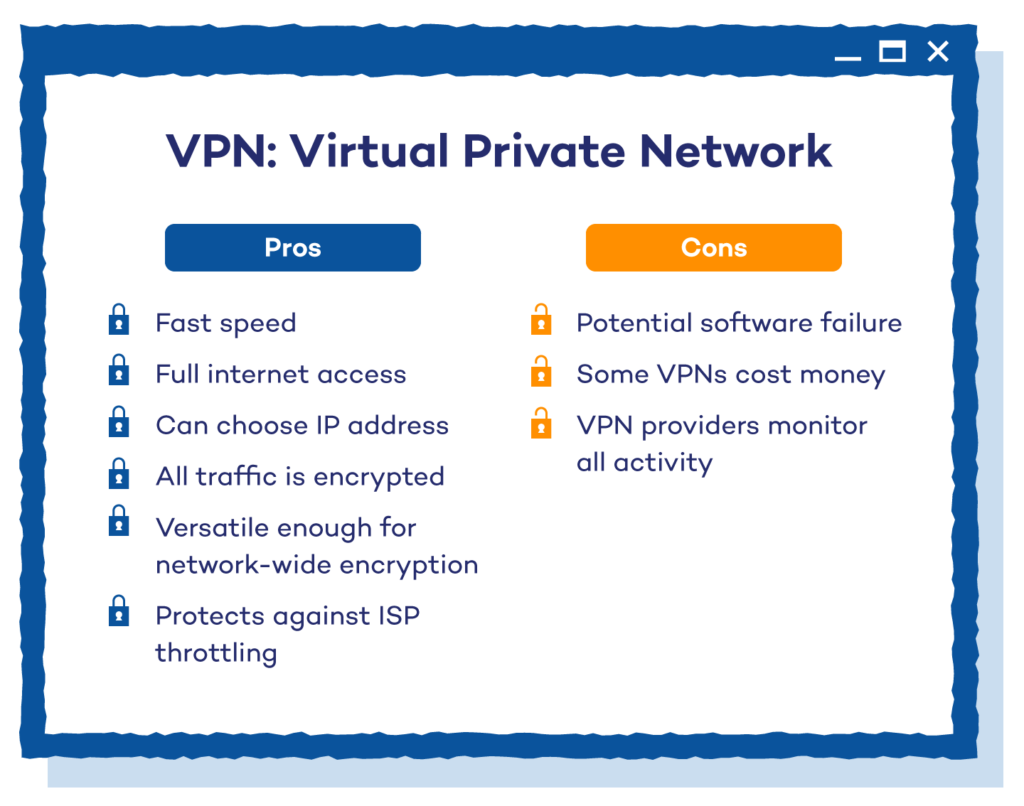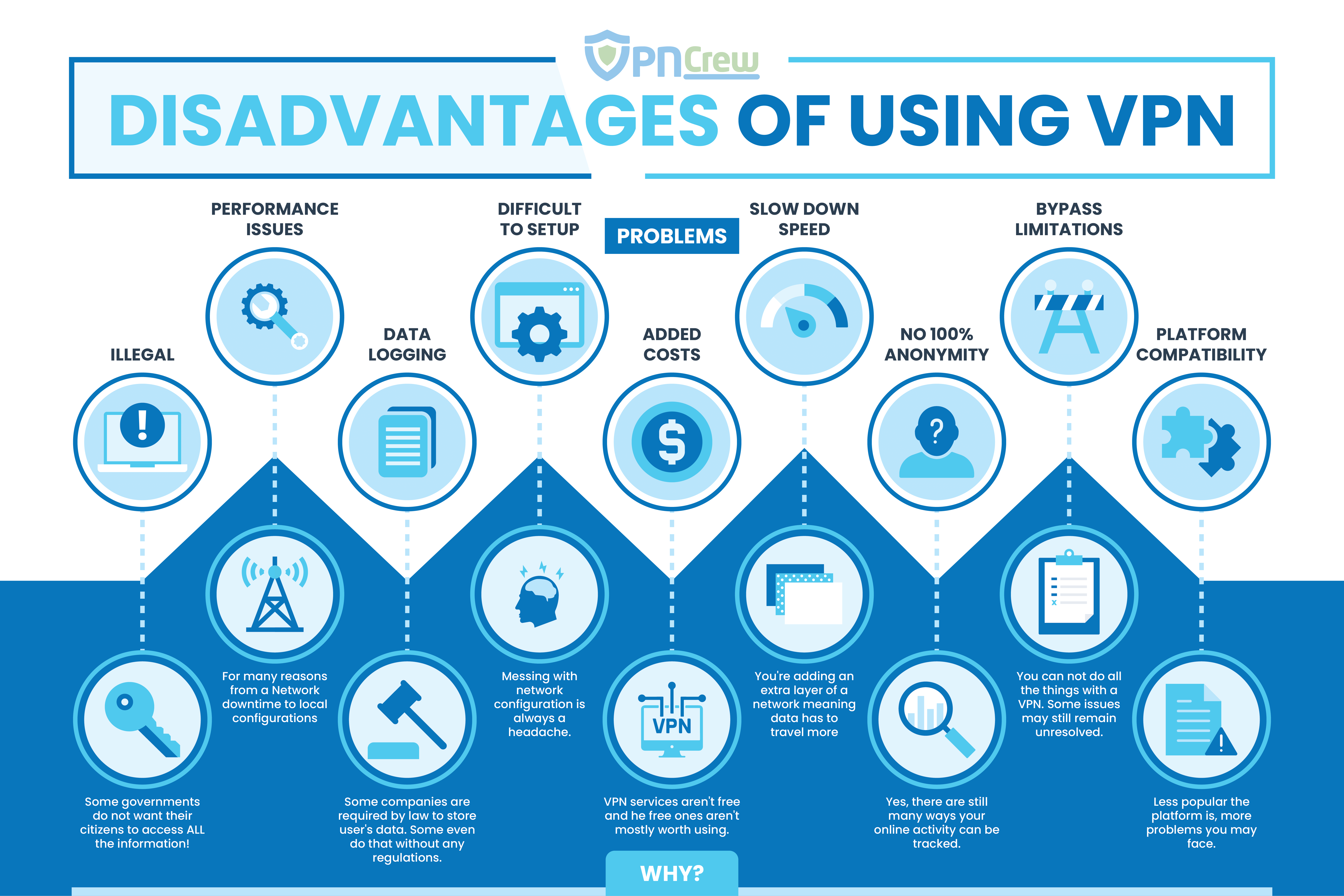Using a VPN offers advantages like enhanced privacy, secure data encryption, and access to restricted content. However, it can also reduce internet speed, may have subscription costs, and can be restricted in certain regions.
But like any tool, VPNs have their pros and cons. Understanding the advantages and disadvantages of using a VPN is crucial. VPNs can offer many benefits, such as enhanced security and access to restricted content. They can also have drawbacks, including slower internet speeds and potential privacy risks.
Whether you’re new to VPNs or considering switching your service, knowing the full picture helps you make informed decisions. This blog will break down the key points, helping you decide if a VPN is right for you. Let’s dive into the details and explore the impact of VPNs on your online experience.

Credit: www.pandasecurity.com
How Vpns Work
A Virtual Private Network (VPN) creates a safe connection over the internet. It hides your real IP address. It makes your online actions private. But how does it work? This section will explain that.
Encryption Methods
VPNs use encryption to protect your data. Encryption converts your information into a code. Only the right key can decode it. This keeps your data safe from hackers.
AES (Advanced Encryption Standard) is a common method. It is very secure. Most VPNs use AES-256 encryption. This means they use a 256-bit key. It is almost impossible to break.
Another method is RSA (Rivest-Shamir-Adleman). It is often used with AES. RSA encrypts the key that AES uses. This adds an extra layer of security.
Tunneling Protocols
VPNs also use tunneling protocols. These protocols create a secure tunnel for your data. They ensure your data travels safely from your device to the VPN server.
OpenVPN is a popular tunneling protocol. It is open-source and very secure. It can use both TCP and UDP ports. This makes it flexible and reliable.
Another common protocol is IPsec (Internet Protocol Security). It works at the network layer. It can secure data between two computers or networks. IPsec is often used with L2TP (Layer 2 Tunneling Protocol).
IKEv2 (Internet Key Exchange version 2) is another option. It is good for mobile devices. It can quickly reconnect if the connection drops. This makes it ideal for smartphones and tablets.
Here is a table to summarize the tunneling protocols:
| Protocol | Features |
|---|---|
| OpenVPN | Open-source, secure, flexible |
| IPsec | Network layer security, often used with L2TP |
| IKEv2 | Good for mobile, quick reconnection |

Credit: www.fortinet.com
Privacy And Security Benefits
Privacy and security are major concerns in the digital world. Using a VPN can help protect your data and maintain your anonymity online. Let’s dive into the privacy and security benefits that come with using a VPN.
Data Protection
One of the main advantages of using a VPN is data protection. When you connect to the internet through a VPN, your data gets encrypted. This means that hackers, ISPs, and other entities cannot easily access your personal information.
Here are some key benefits of data protection with a VPN:
- Encryption keeps your data safe from hackers.
- Prevents ISPs from tracking your online activities.
- Protects sensitive information during online transactions.
Anonymity Online
Another significant benefit of using a VPN is maintaining anonymity online. A VPN hides your IP address, making it difficult for websites and services to track your location and online behavior.
Here are some ways VPNs provide anonymity online:
- Masks your real IP address.
- Prevents websites from tracking your browsing habits.
- Allows you to access geo-restricted content without revealing your location.
Using a VPN is a great way to ensure your privacy and security online. With data protection and anonymity, you can browse the internet with peace of mind.
Access To Restricted Content
Using a VPN allows users to access content that is restricted based on geographical location. This capability is one of the most popular reasons people use VPNs. Whether you want to watch a show that is only available in another country or access websites that are blocked in your region, a VPN can help you do that.
Bypassing Geographical Blocks
A VPN can bypass geographical blocks by masking your IP address. This makes it look like you are accessing the internet from a different location. Websites and services will think you are in the allowed region and grant you access.
For example, if you are in a country where certain news sites are blocked, you can use a VPN to access those sites. Simply connect to a VPN server located in a country where the site is not blocked. This can be very useful for getting information from different sources.
Streaming Services Access
Many streaming services limit content based on the user’s location. With a VPN, you can access content from these services that would otherwise be unavailable.
For instance, Netflix offers different shows and movies in different countries. By using a VPN, you can connect to a server in a country that has the content you want to watch. This expands your viewing options and allows you to enjoy a wider range of entertainment.
Below is a table summarizing the advantages and disadvantages of using a VPN for accessing restricted content:
| Advantages | Disadvantages |
|---|---|
| Access to blocked websites | Possible slower connection speeds |
| Watch geo-restricted content | Some services may detect and block VPNs |
| Enhanced privacy and security | Potential cost of VPN subscription |

Credit: www.vpncrew.com
Cost And Performance
Using a VPN can have both positive and negative effects on your internet experience. Let’s delve into the costs involved and how a VPN can impact your internet speed.
Subscription Fees
Most VPN services require a subscription fee. These fees can vary:
- Free VPNs: Offer limited features and slower speeds.
- Paid VPNs: Provide better features, faster speeds, and more servers.
Here’s a quick comparison of typical costs:
| Type | Monthly Cost | Yearly Cost |
|---|---|---|
| Free | $0 | $0 |
| Basic | $3 – $5 | $30 – $50 |
| Premium | $8 – $12 | $80 – $120 |
Choose a plan based on your needs and budget. Free plans can be tempting, but they often come with limitations.
Impact On Internet Speed
Using a VPN can affect your internet speed. Factors include:
- Server Distance: The further the server, the slower the speed.
- Encryption Level: Higher encryption means more security but can slow down speed.
- Server Load: More users on a server can reduce speed.
Here’s how VPNs can impact speed:
| Factor | Impact |
|---|---|
| Server Distance | High |
| Encryption Level | Medium |
| Server Load | Low |
To minimize speed issues, choose a server close to your location. Opt for a VPN with good performance reviews.
Potential Drawbacks
While VPNs offer various benefits, they also come with their share of drawbacks. Understanding these potential issues is crucial before committing to a VPN service. Below, we explore some of the significant drawbacks.
Legal Implications
Using a VPN might have legal implications depending on your location. Some countries have strict laws against VPN usage. This can lead to fines or other legal consequences. Even in countries where VPNs are legal, certain activities conducted through VPNs may be illegal. Always check local laws before using a VPN.
Data Logging Concerns
Many VPNs claim to have a no-logs policy. But not all VPNs are transparent about their practices. Some VPN providers still keep logs of user activity. This can compromise your privacy. It’s essential to choose a VPN that has a clear and verified no-logs policy.
| Disadvantage | Explanation |
|---|---|
| Potential Legal Issues | Using a VPN can be illegal in some countries. |
| Data Logging | Some VPNs keep logs despite claiming not to. |
In summary, the potential drawbacks of using a VPN include legal implications and data logging concerns. Being aware of these issues can help you make an informed decision.
Choosing The Right Vpn
Selecting a VPN can be daunting. The market is filled with options. Each VPN offers unique features. Understanding these features helps you make an informed decision.
Key Features To Consider
When selecting a VPN, consider these key features:
- Security: Look for strong encryption protocols like AES-256.
- Speed: Ensure the VPN offers fast connection speeds.
- Server Locations: More server locations mean better access to global content.
- Privacy: Check if the VPN has a strict no-logs policy.
- Compatibility: The VPN should support multiple devices and operating systems.
- Customer Support: Reliable customer support is crucial for troubleshooting issues.
Popular Vpn Providers
Here are some well-known VPN providers:
| Provider | Key Features |
|---|---|
| ExpressVPN | High-speed, strong security, over 90 countries |
| NordVPN | Double VPN, strict no-logs policy, 24/7 support |
| CyberGhost | Easy to use, great for streaming, 256-bit encryption |
| Surfshark | Unlimited devices, strong security, affordable |
Choosing the right VPN involves comparing these features. Make sure the VPN fits your needs and budget. Doing so will enhance your online privacy and security.
Future Of Vpn Technology
The future of VPN technology holds much promise. With constant advancements in internet security, VPNs are evolving. They are becoming more robust and user-friendly. This section explores the emerging trends and potential innovations in VPN technology.
Emerging Trends
Several trends are shaping the future of VPNs. First, there is increased adoption of VPNs in both personal and professional spheres. People are more aware of the need for online privacy. Companies are also using VPNs to secure remote work.
Second, integration with other security tools is on the rise. Combining VPNs with firewalls and antivirus software provides a more comprehensive security solution. Third, VPNs are becoming faster and more reliable. Improvements in infrastructure and technology are reducing latency and increasing speed.
Potential Innovations
Innovations are driving the next phase of VPN technology. One potential innovation is the use of quantum encryption. This could make VPNs even more secure, protecting data from future threats. Another innovation is the development of AI-powered VPNs. AI can enhance VPN performance by optimizing connections and detecting threats in real-time.
Additionally, the rise of 5G technology will impact VPNs. Faster internet speeds will allow for better VPN performance. Users will experience smoother and more seamless connections. Finally, more user-friendly interfaces are likely. Simplified setups and intuitive controls will make VPNs accessible to a wider audience.
Frequently Asked Questions
What Is A Vpn?
A VPN is a Virtual Private Network. It encrypts your internet connection. This provides privacy and security.
How Does A Vpn Work?
A VPN routes your internet traffic through a secure server. This masks your IP address. It also encrypts your data.
What Are Vpn Advantages?
A VPN enhances your online privacy. It secures your data. It can bypass geo-restrictions. It also helps in avoiding censorship.
Are There Any Vpn Disadvantages?
VPNs can slow down your internet speed. Some VPNs may log your data. Free VPNs may have limited features.
Conclusion
VPNs offer many benefits, such as privacy and access to restricted content. They can protect your data from hackers and snoopers. But, VPNs also have downsides. They may slow your internet speed. Some VPNs can be expensive. Not all VPNs guarantee complete anonymity.
Weigh the pros and cons carefully. Choose a VPN that fits your needs. Protect your online activities. Stay informed and make smart choices.

